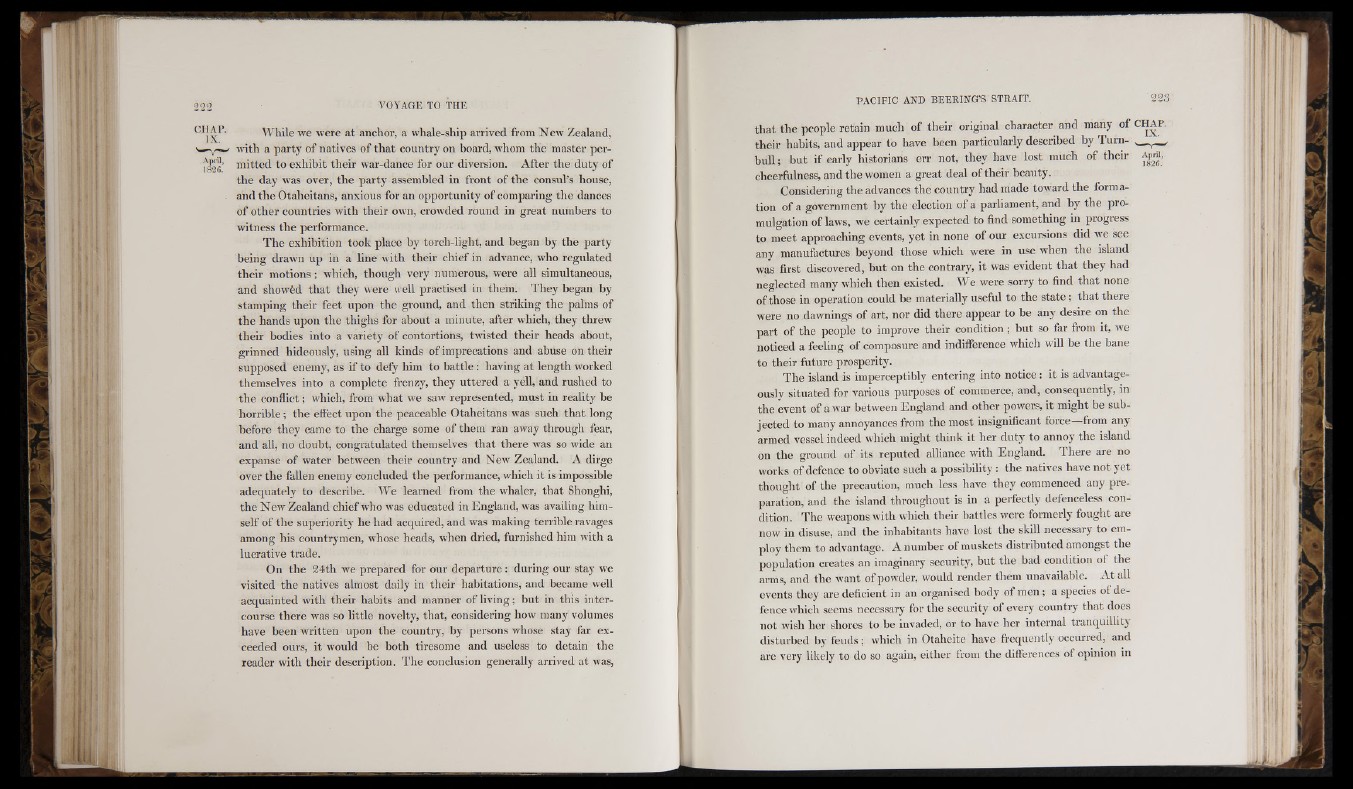
CHAP.
IX.
April,
182fi.
While we were at anchor, a whale-ship arrived from New Zealand,
with a party of natives of that country on board, whom the master permitted
to exhibit their war-dance for our diversion. After the duty of
the day was over, the party assembled in front of the consul’s house,
and the Otaheitans, anxious for an opportunity of comparing the dances
of other countries with their own, crowded round in great numbers to
witness the performance.
The exhibition took place by torch-light, and began by the party
being drawn up in a line with their chief in advance, who regulated
their motions ; which, though very numerous, were all simultaneous,
and showfed that they were w ell practised in them. They began by
stamping their feet upon the ground, and then striking the palms of
the hands upon the thighs for about a minute, after which, they threw
their bodies into a variety of contortions, twisted their heads about,
grinned hideously, using all kinds of imprecations and abuse on their
supposed enemy, as if to defy him to battle; having at length worked
themselves into a complete frenzy, they uttered a yell, and rushed to
the conflict; which, from what we saw represented, must in reality be
horrible ; the effect upon the peaceable Otaheitans was such that long
before they came to the charge some of them ran away through fear,
and all, no doubt, congratulated themselves that there was so wide an
expanse of water between their country and New Zealand. A dirge
over the fallen enemy concluded the performance, which it is impossible
adequately to describe. W e learned from the whaler, that Shonghi,
the New' Zealand chief who was educated in England, was availing himself
of the superiority he had acquired, and was making terrible ravages
among his countrymen, whose heads, when dried, furnished him with a
lucrative trade.
On the 24th we prepared for our departure: during our stay we
visited the natives almost daily in their habitations, and became well
acquainted with their habits and manner of living; but in this intercourse
there was so little novelty, that, considering how many volumes
have been written upon the country, by persons whose stay far exceeded
ours, it would be both tiresome and useless to detain the
reader with their description. The conclusion generally arrived at was.
that the people retain much of their original character and many of
their habits, and appear to have been particularly described by Turn- .—
bull ; but if early historians err not, they have lost much of their Afîi,
cheerfulness, and the women a great deal of their beauty.
Considering the advances the country had made toward the formation
of a government by the election of a parliament, and by the promulgation
of laws, we certainly expected to find something in progress
to meet approaching events, yet in none of our excursions did we see
any manufactures beyond those which were in use when the island
was first discovered, but on the contrary, it was evident that they had
neglected many which then existed. YYe were sorry to find that none
of those in operation could be materially useful to the state ; that there
were no dawnings of art, nor did there appear to be any desire on the
part of the people to improve their condition ; but so far from it, we
noticed a feeling of composure and indifference which will be the bane
to their future prosperity.
The island is imperceptibly entering into notice ; it is advantageously
situated for various purposes of commerce, and, consequently, in
the évent of a war between England and other powers, it might be subjected
to many annoyances from the most insignificant force—from any
armed vessel indeed which might think it her duty to annoy the island
on the ground of its reputed alliance with England. There are no
works of defence to obviate such a possibility : the natives have not yet
thought of the precaution, much less have they commenced any preparation,
and the island throughout is in a perfectly defenceless condition.
The weapons with which their battles were formerly fought are
now in disuse, and the inhabitants have lost the skill necessary to employ
them to advantage. A number of muskets distributed amongst the
population creates an imaginary security, but the had condition of the
arms, and the want of powder, would render them unavailable. At all
events they are deficient in an organised body ot men ; a species of defence
which seems necessary for the security of every country that does
not wisli her shores to be invaded, or to have her internal tranquillity
disturbed by feuds ; which in Otaheite have fi-equently occurred, and
are very likely to do so again, either from the differences of opinion in
II Ü
• i l